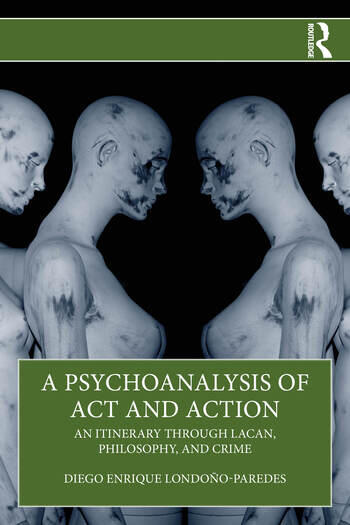A Psychoanalysis of Act and Action: An Itinerary through Lacan, Philosophy, and Crime

Book Details
- Publisher : Routledge
- Published : 2025
- Cover : Paperback
- Pages : 208
- Category :
Psychoanalysis - Catalogue No : 98268
- ISBN 13 : 9781041071426
- ISBN 10 : 1041071426
Reviews and Endorsements
It is rare to find a scholar who is as well-versed in philosophy as in Lacanian psychoanalysis and who is willing to stage a genuine encounter between these two domains. This is what we find in Diego Londoño's A Psychoanalysis of Act and Action: a nuanced thinking through how these two traditions conceptualize acts and actions with a view to grasping the importance of Lacan's contributions in this regard. A dazzling 'ambidexterity of analysis' comes to the fore, where philosophical resources are brought to bear on multiple facets of Lacan's teaching, and where philosophical notions are re-thought psychoanalytically. A tour de force; the scholarly - and psychoanalytic - brilliance shines through, page after page.
Derek Hook, author of Six Moments in Lacan
This is the first book in English that demonstrates how Lacan’s theory cannot simply be understood as the outcome of ‘the linguistic turn in psychoanalysis’. With exemplary clarity and a thorough grasp of Lacan’s entire body of work, the author shows that speech and language constitute but one side of Lacan’s innovative return to Freud, and that this symbolic dimension needs to be balanced against an equally important, yet often overlooked conception of the act. Indeed, throughout his long and productive career, Lacan defined many fundamental notions of psychoanalytic practice, including the clinical position of the analyst itself, in terms of a certain relationship to action. It is no exaggeration to say that, in teasing out this psychoanalysis of act and action, the author allows the reader to discover a crucial aspect of Lacan’s contributions that has never received the attention it deserves. This book is a truly magnificent feat of scholarship, which will be an important reference source for many years to come.
Dany Nobus, Professor of Psychoanalytic Psychology, Brunel University of London
It has been several decades since the so-called "linguistic turn." Yet, no book rigorously addresses the difference between act and action, between performativity, performance, and pragmatism — at least not from within the Lacanian field. And yet, without such distinctions, what would it mean to think the question of the act in psychoanalysis? In this sharp and compelling book, Diego Londoño takes up this challenge, offering a powerful and decisive intervention into contemporary debates in the philosophy of mind, showing how psychoanalysis —particularly Lacanian psychoanalysis — cannot be reduced to a theory of cognition or representation. Through a careful engagement with concepts such as anxiety and the gaze (as they appear in the difference between passage à l’acte and acting out), as well as the relation between ethics and aesthetics in sublimation, and the subjective division between statement and utterance, Londoño reminds us of Lacan’s crucial question: What is a philosophy that takes psychoanalysis seriously? Thus, the question is not whether Lacan will survive the twenty-first century but whether the twenty-first century can survive Lacan’s questions.
Carlos Gómez Camarena, International School of the Forums of the Lacanian Field and Universidad Iberoamericana, Mexico
This book presents an exceptionally nuanced exploration of the psychoanalytic understanding of human action. Through meticulous theoretical analysis, the text illuminates the radical originality of the psychoanalytic approach to act, distinguishing it from conventional philosophical and neurobiological paradigms. The work reveals how psychoanalysis transcends reductive explanations of human behavior, offering instead a framework that accommodates both the symbolic dimensions of action and the fundamental impasses of language. This sophisticated theoretical contribution offers clinicians, theorists, and cultural critics an innovative perspective and a powerful conceptual apparatus for addressing the complexities of modern subjectivity and its manifold expressions in both clinical settings and broader social conflicts.
Silvia Rivera-Largacha, Psychoanalyst and Consultant for Professional Care in Mental Health and Psychosocial Support at UNDP – United Nations Development Programme Colombia

